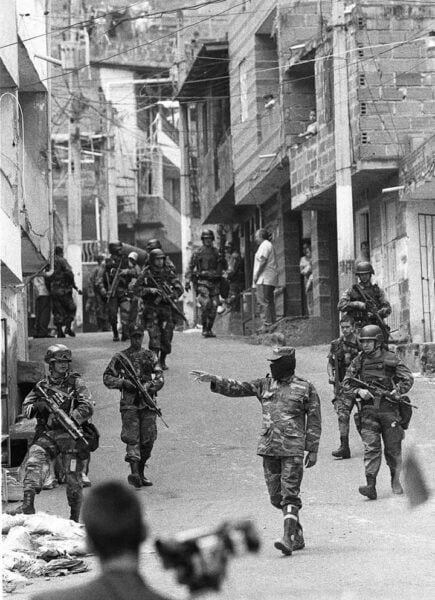
Through one of his columns for the newspaper El Espectador, Julián López de Mesa denounced an alleged censorship of Jesús Abad Colorado's exhibition 'The Witness'. As he argues in his writing, until a few months ago it was quite easy to enter the space where the montage is located, on Calle Sixth with Carrera Novena in Bogotá, however, for a while now, entry into space has become complicated. To expand his experience, Julián explained what happened in an interview with W Radio.
It should be remembered that 'The Witness' is a photographic exhibition in which Jesús Abad Colorado captured several of the memories he has regarding the armed conflict in the country. According to the curator, María Belén Sáez de Ibarra, it is a photographic anthology from 1992 to 2018. “The exhibition maintains the ethical tone of Jesús Abad Colorado, where he does not accuse or take sides, but invites collective responsibility for a painful history that has gone through the country and a reconciliation to foster hope and reconstruction,” says the expert.
Lopez argued that the obstacles to entering, translated into lengthy questionnaires made by the authority to the attendees, were increasing. “It is no longer enough to say where you are going, but the people in charge of the checkpoint thoroughly inquire about who the visitors are, where they are going and why. Since March, in addition, they leave visitors waiting at the checkpoint, sometimes for almost an hour, without any explanation or arguing excuses that are increasingly brought out of their hair to demotivate those who want to see the exhibition,” he denounced in the text published in El Espectador. As he highlighted in his talk with the station, these words written by him were the result of a feeling of indignation.
As explained by the professor at the Universidad del Rosario and the Universidad Santo Tomás, the problematic situation to enter to see the exhibition in the Cloister of San Agustín is even 'shameless'. For him, watching the exhibition is a must for all Colombians, so he usually takes his students to see the show always. Until February of this year, he told W Radio, the entrance was from the south-west of Plaza de Bolivar, however, some time later, that door was no longer available. The teacher commented that the authorities who monitor the area told him that they 'no longer know' where he entered to see the exhibition of the renowned photographer.

“Last week, this state censorship, which is intended to be buried, was even more shameless: when I arrived with my group, the officer in charge of the checkpoint informed us that the exhibition halls were full and that we had to wait, in torrential rain, because the capacity of 20 people was supposedly full. After half an hour, we investigated again when we saw that no one was leaving and this time he told us that now the exhibition was guided, that there was only one guide and that he had not yet finished the tour with the previous group,” he said in his opinion column published in El Espectador. He said that it was almost an hour after the events that he was allowed to enter.
Upon entering the room, he realized that the place, unlike what the authority to prohibit his entry told him, was never full. Likewise, he denied the alleged existence of a capacity limit for attendees, since, it should be noted, that the space is completely open and clear, a colonial cloister. The excuses, according to the teacher, have been different each time he wanted to enter, for example, on one occasion, he was told that in order to enter it would be necessary for him to enter with a military escort. “That's unheard of,” he said. One day, it was even said that due to the ongoing conflict between Ukraine and Russia it was better not to open the cloister, because it was 'not safe'.
In his interview with the broadcaster, he pointed out that he was finding out the reasons why the rules of entry were constantly changing and, he said, he found that, like him, those who work within the space were also confused. According to the employees, in very short periods of time, they were receiving totally different orders regarding their work within the Senate. He clarified that the orders did not come from those who manage the space or from those who work inside, on the contrary, they would be direct orders from the uniformed men in charge of the checkpoint.
“What is the fear that the exhibition of The Witness causes to this government? Why, as the electoral contest progresses, do they try to prevent people from freely accessing, as is their right, to exposure? Censorship is a tacit acceptance of responsibility and the message that the authorities are sending, through the public forces, is that an exhibition showing the consequences of the war and its leaders does not suit the interests of this government (...)”, he concluded in his note.
Jesús Abad Colorado, who was also in the interview, stressed that since the beginning of the presidency of Iván Duque, the area around the Cloister has been more controlled and restricted. “Over the months, they expanded the security perimeter of the Casa de Nariño (...) I think the National University has to make an appeal to the President of the Republic, why are they restricting entry?” , he commented.
Keep reading:
Últimas Noticias
Debanhi Escobar: they secured the motel where she was found lifeless in a cistern

The oldest person in the world died at the age of 119

Macabre find in CDMX: they left a body bagged and tied in a taxi
The eagles of America will face Manchester City in a duel of legends. Here are the details

Why is it good to bring dogs out to know the world when they are puppies




